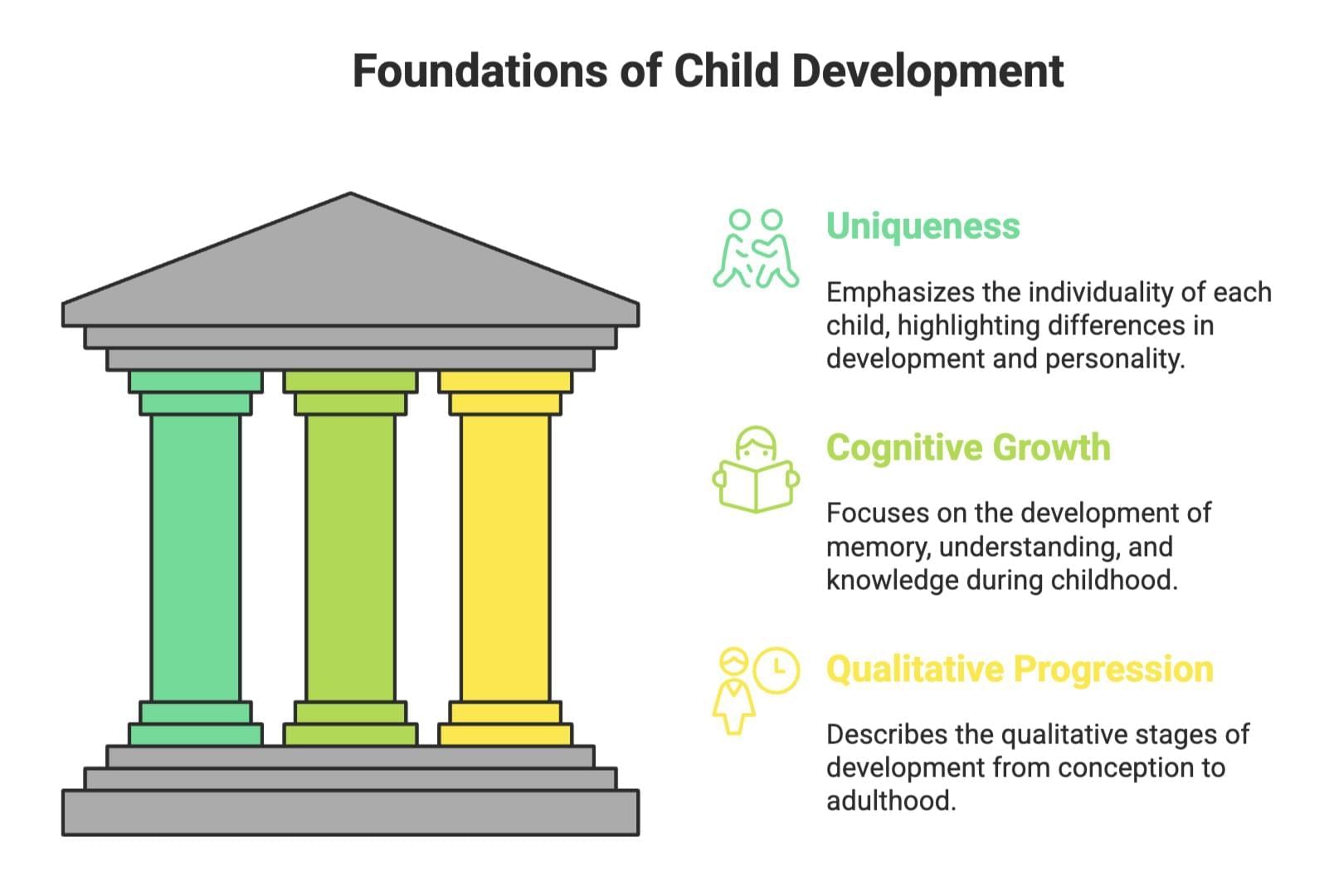CTET & State TET Exam > CTET & State TET Notes > Child Development and Pedagogy for CTET Preparation > Cheat Sheet: Principles of Child Development
Cheat Sheet: Principles of Child Development | Child Development and Pedagogy for CTET Preparation - CTET & State TET PDF Download
| Table of contents |

|
| Key Concepts |

|
| Principles of Child Development |

|
| Educational Importance of Principles |

|
| Factors Influencing Child Development |

|
| Child Psychology |

|
| Importance of Child Psychology |

|
Child development involves the scientific study of growth, change, and stability from conception through adolescence. Children pass through similar stages, but the rate and pace vary, highlighting the uniqueness of each child.
Key Concepts
- A Child is Unique and Special: No two children are alike, even twins, differing in development, characteristics, personality, and behaviour.
- Childhood: A crucial stage where cognitive development builds memory, understanding, experience, and knowledge.
- Measured Qualitatively: Development progresses qualitatively from conception through stages: newborn, toddler, young child, teenager, adult, and death.

Principles of Child Development
- Development Follows a Pattern or Sequence
- Cephalocaudal (Head to Toe) Sequence: Control develops from head to toe; head/face control (0-2 months), arm use (2-6 months), leg control for crawling/standing/walking (6-12 months).
- Proximodistal Sequence: Development from body centre to outer parts; spinal cord before arms, arms before hands, hands/feet before fingers/toes.
- Development Involves Change: Continuous changes in size, proportions, and mental, motor, behavioural skills (e.g., improved language, cognition).
- Development Proceeds from General to Specific: Responses shift from general (e.g., whole-hand grasp) to specific (e.g., thumb-forefinger grasp).
- Development is Correlated or Integrated: Physical, mental, social, and emotional aspects interconnect; healthy physical growth boosts social/emotional stability.
- Development is a Continuous Process: Ongoing from conception to death, rapid in infancy, slower later.
- Development of Individuality: Differences arise from heredity and environment (e.g., nutrition, medical care, learning opportunities).
- Development Occurs at Different Rates: The brain matures by 6-8 years, hands/feet/nose in early adolescence, heart/liver/digestive system grow through adolescence.
- Development Proceeds Stage by Stage: Stages have unique traits; age limits are approximate due to individual differences.
- Early Development is More Important: Early experiences (nutrition, emotional support, social interactions, culture) shape development.
- Development is Predictable: The range of development is predictable, though mental development is harder to pinpoint than physical.
- Social Cognitive Theory: By N.E. Miller and J. Dollard (1941), children learn by observing, imitating, and receiving reinforcement or punishment.
- Development Does Not Proceed at the Same Pace (Theory of Maturation): Gesell’s theory: Children progress through stages at individual rates (e.g., walking timing varies).
Educational Importance of Principles
- Developing Independence and Self-Reliance: Teachers guide children to think independently, offering hints when stuck.
- Respecting Individual Development Pace: Varied activities cater to different speeds, aligning with interests.
- Evaluating Development Levels: Assess levels to support and understand children’s desires and thoughts.
- Widening Activities and Ideas: Education expands activities, fostering physical and psychological growth.
Factors Influencing Child Development
Internal Factors
- Heredity: Genetics influence height, weight, body build, and growth differences between boys and girls.
- Physical Factors: Good nutrition and activity enhance muscle growth, reduce obesity risk.
- Intelligence: Impacts thought, creativity, retention, and academic/physical growth speed.
- Emotional Factors: Affect social, mental, physical, moral, and language development; balanced emotions aid regulation.
External Factors
| Factor | Description |
|---|---|
| Family | Affectionate bonds aid growth; large families provide values, small ones foster independence; stress or broken families harm learning, emotions. |
| Physical Environment | Pollution, noise, overcrowding, poor housing, and neighborhood quality impact mental, emotional, physical development. |
| Socio-Economic Conditions | Wealthy families offer good schools, activities; less fortunate face ill-health, stress, limiting physical, cognitive, social growth. |
Child Psychology
- Definition: Study of mental, emotional, and behavioural development from birth to adolescence.
- Focus (Mosby’s Medical Dictionary): Examines how children learn, think, interact, respond, form friendships, and comprehend emotions.
Importance of Child Psychology
- Understanding the Child: Comprehends development and behaviour.
- Identifying Psychological Issues: Recognizes problems with psychological roots.
- Effective Communication: Establishes clear communication with children.
- Creating a Conducive Learning Environment: Enhances teaching and learning processes.
- Building Confidence: Gains trust of child and parents for better growth understanding.
- Recognizing Individual Differences: Tailors content to learning differences, guiding skill development.
- Understanding Behavior Causes: Explains behaviours, aids interventions.
- Studying Personality Traits: Predicts future behaviour, guides development.
The document Cheat Sheet: Principles of Child Development | Child Development and Pedagogy for CTET Preparation - CTET & State TET is a part of the CTET & State TET Course Child Development and Pedagogy for CTET Preparation.
All you need of CTET & State TET at this link: CTET & State TET
|
70 videos|154 docs|42 tests
|
Related Searches















